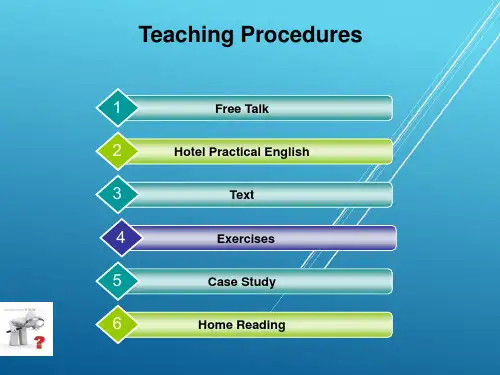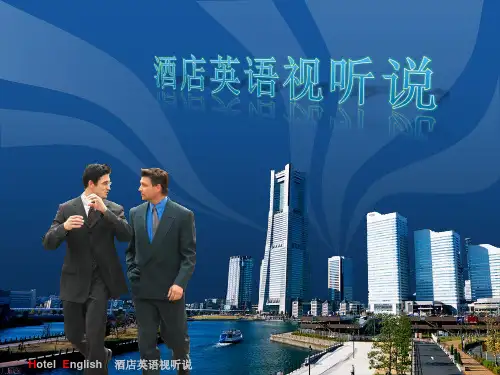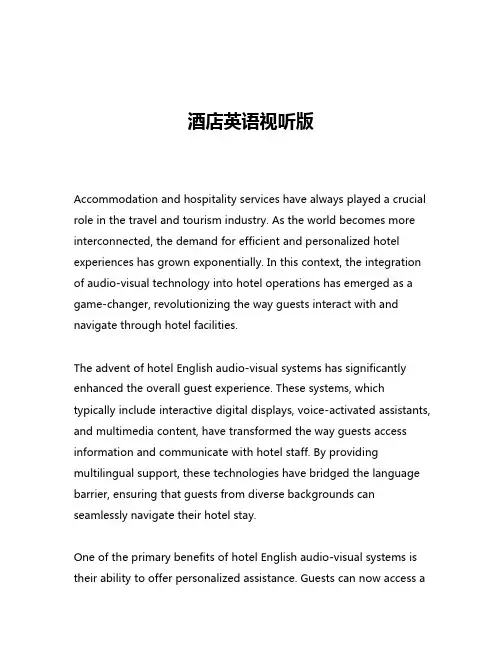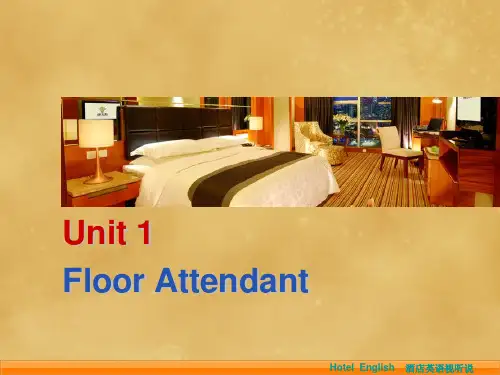酒店英语视听说课件
- 格式:pptx
- 大小:12.72 MB
- 文档页数:201




酒店英语视听版Accommodation and hospitality services have always played a crucial role in the travel and tourism industry. As the world becomes more interconnected, the demand for efficient and personalized hotel experiences has grown exponentially. In this context, the integration of audio-visual technology into hotel operations has emerged as a game-changer, revolutionizing the way guests interact with and navigate through hotel facilities.The advent of hotel English audio-visual systems has significantly enhanced the overall guest experience. These systems, which typically include interactive digital displays, voice-activated assistants, and multimedia content, have transformed the way guests access information and communicate with hotel staff. By providing multilingual support, these technologies have bridged the language barrier, ensuring that guests from diverse backgrounds can seamlessly navigate their hotel stay.One of the primary benefits of hotel English audio-visual systems is their ability to offer personalized assistance. Guests can now access awealth of information about hotel amenities, services, and local attractions simply by interacting with the digital displays or voice-activated assistants in their rooms. This level of on-demand access empowers guests to plan their itineraries, make reservations, and troubleshoot any issues they may encounter, all without the need for face-to-face interaction with hotel staff.Moreover, the integration of audio-visual technology has streamlined the check-in and check-out processes. Digital kiosks and self-service portals allow guests to complete these tasks independently, reducing wait times and ensuring a more efficient flow of traffic at the front desk. This not only enhances the guest experience but also frees up hotel staff to focus on more personalized service and addressing any unique guest needs.In addition to providing informational and operational support, hotel English audio-visual systems have also revolutionized the entertainment experience. Guests can now access a wide range of multimedia content, including on-demand movies, TV shows, and music, directly from the comfort of their rooms. These systems often feature seamless integration with guests personal devices, enabling them to stream their own content or even participate in virtual meetings and conferences while traveling.The incorporation of audio-visual technology has also had asignificant impact on the way hotels market and communicate with their guests. Digital signage and interactive displays have become powerful tools for showcasing hotel amenities, promotions, and local attractions. By leveraging these technologies, hotels can create immersive and engaging experiences that capture the attention of guests and foster a stronger connection with the brand.Furthermore, the data collected from hotel English audio-visual systems can provide valuable insights into guest behavior and preferences. By analyzing usage patterns, hotels can optimize their services, tailor their offerings, and enhance the overall guest experience. This data-driven approach to hotel management has become increasingly important in an era where personalization and customer satisfaction are key differentiators in a highly competitive market.However, the integration of audio-visual technology in hotels is not without its challenges. Ensuring the reliability and security of these systems is paramount, as guests entrust hotels with their personal information and expect seamless and uninterrupted service. Hotels must invest in robust IT infrastructure, cybersecurity measures, and regular maintenance to maintain the integrity and functionality of their audio-visual systems.Another challenge lies in the need for comprehensive staff trainingand development. Hotel employees must be equipped with the knowledge and skills to effectively operate and troubleshoot the audio-visual systems, as well as to provide guidance and support to guests who may not be tech-savvy. Ongoing training and continuous improvement initiatives are essential to ensuring a high level of service and guest satisfaction.Despite these challenges, the benefits of hotel English audio-visual systems far outweigh the drawbacks. By enhancing the guest experience, improving operational efficiency, and providing valuable data-driven insights, these technologies have become an integral part of the modern hotel landscape. As the hospitality industry continues to evolve, the integration of audio-visual solutions will undoubtedly play an increasingly crucial role in shaping the future of hotel experiences.In conclusion, the hotel English audio-visual edition represents a transformative shift in the way guests interact with and experience hotel services. From personalized assistance and streamlined operations to immersive entertainment and data-driven decision-making, these technologies have fundamentally changed the hospitality landscape. As the industry continues to adapt and innovate, the integration of audio-visual solutions will undoubtedly remain at the forefront of enhancing the guest experience and driving the success of hotels in the years to come.。






